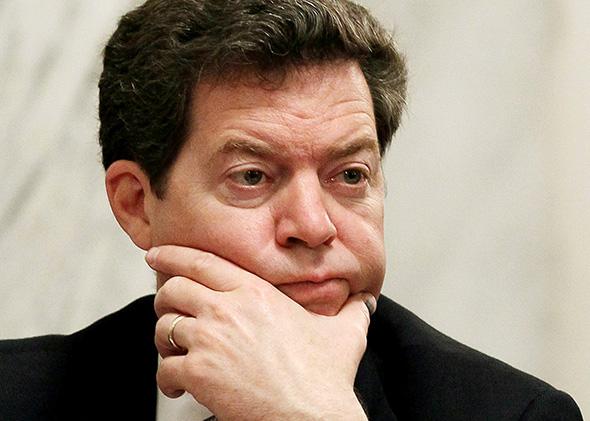Kansas Gov. Sam Brownback has long despised his state’s supreme court, whose independence allows it to push back against the Republican governor’s failed Tea Party experiment with slashing taxes and gutting government programs. Now Brownback has discovered a simple way to conquer the court: Threaten it with total destruction. In early June, Brownback signed a bill that will defund the entire state’s judiciary if the supreme court rules against a (probably unconstitutional) law the governor favors. The extortionist measure puts the court in a bind. If it bends to political pressure, it’ll reveal itself to be toothless. If it follows the constitution and upholds the law, it’ll instantly wipe out the state’s third branch of government.
What’s a Kansas supreme court justice to do? Brownback may think he’s devised the perfect trap to tame the court, but he’s forgotten one escape hatch against autocracy—the United States Constitution. An obscure, widely ignored provision of America’s founding charter seems designed to prevent precisely this sort of power grab. So if the Kansas Supreme Court really wants to fight back, it may have only one option remaining: Sue Brownback—in federal court.
Tucked away in the Constitution is the terse command that the “United States shall guarantee to every state in this union a republican form of government.” The meaning of this so-called guarantee clause has irritated the U.S. Supreme Court for centuries. In 1841, the question of what constituted a republican government became concrete, when a group of reformers led a rebellion against Rhode Island’s borderline despotic government. The insurrection became a small-scale civil war within the state. Soon, two governments—the old oppressive one and the new democratic one—were vying for legitimacy. A reformer took the contest to the Supreme Court, asking the justices to rule that the new government was the only republican one, and thus the legitimate government of Rhode Island.
Faced with resolving a contentious and potentially violent political crisis, the Supreme Court balked. The judiciary, the justices declared, had no business resolving what constituted a “republican form of government.” That was a political question for Congress to decide. With its ruling, the court clumsily sidestepped its most basic duty—to interpret the Constitution—and left a lynchpin of that document at the mercy of the political branches.
Over the last half-century, however, the guarantee clause has slowly risen from the dead. First, in 1962’s Baker v. Carr, the court broadened its authority to wade into political disputes. Then, in a landmark 1992 case called New York v. United States, the Supreme Court came right to the edge of declaring the formal resuscitation of the guarantee clause, coyly suggesting that “perhaps not all claims under the Guarantee Clause present” political questions beyond the court’s ken. (“We need not resolve this difficult question today,” the court quickly added.) In the same ruling, the court also hinted that the clause was never truly dead—just in hiding, a kind of constitutional coelacanth. Justice John Marshall Harlan’s famous dissent in Plessy v. Ferguson, after all, insisted that racial segregation was “inconsistent with the guarantee given by the Constitution to each State of a republican form of government.”
Finally, in 2014, the 10th Circuit Court of Appeals kicked open the door to a full-blown revival of the guarantee clause. In a daringly broad ruling, the court held that the clause was absolutely “justiciable”—that is, an issue that courts can rule on, not a political question for Congress to hash out. The Supreme Court never reviewed the decision, but the case brought the clause roaring back to the legal mainstream.
But even if the Supreme Court decides courts can hear guarantee clause cases, it still hasn’t explained what “a republican form of government” actually means. It’s not an easy question. In the 10th Circuit case, Colorado legislators challenged a ballot initiative that required all legislative tax increases to go to a popular vote. By ripping tax law out of the legislature’s hands, these representatives argued, Coloradans had deprived their state of a republican government, whose legislature alone is responsible for all laws.
As a Cato Institute brief persuasively lays out, this argument is nonsense. Although legislators may be keen to use the guarantee clause to invalidate initiatives and referendums in every state, the true meaning of a republican government is more fundamental. “The overriding purpose of the Guarantee Clause,” the brief explains, “was to prevent any state from lapsing into, or remaining in, monarchy or dictatorship.”
Has Brownback’s consolidation of power moved Kansas away from a republican government and toward a dictatorship? James Madison might think so. In The Federalist No. 39, Madison laid out “the distinctive characters of the republican form.” Madison, often called the father of the Constitution, seemed to envision an independent judiciary as an obvious feature of any government that called itself republican. The other framers of the Constitution may have had conflicting views about the role of the judiciary—but they clearly couldn’t imagine a republican government without it.
The Constitution may not explain exactly what a “republican form of government” looks like—but it certainly doesn’t look like Brownback’s scheme. Instead of fixing his tax-slashing catastrophe, Brownback has decided to devote his energies to neutralizing—or, failing that, abolishing—the judiciary. The guarantee clause seems designed to prevent would-be autocrats like Brownback from bullying his state government into total submission. Federal judges generally dislike meddling in state’s political affairs. But at this point, the Constitution may be the only thing that can save Kansas from its own governor.
